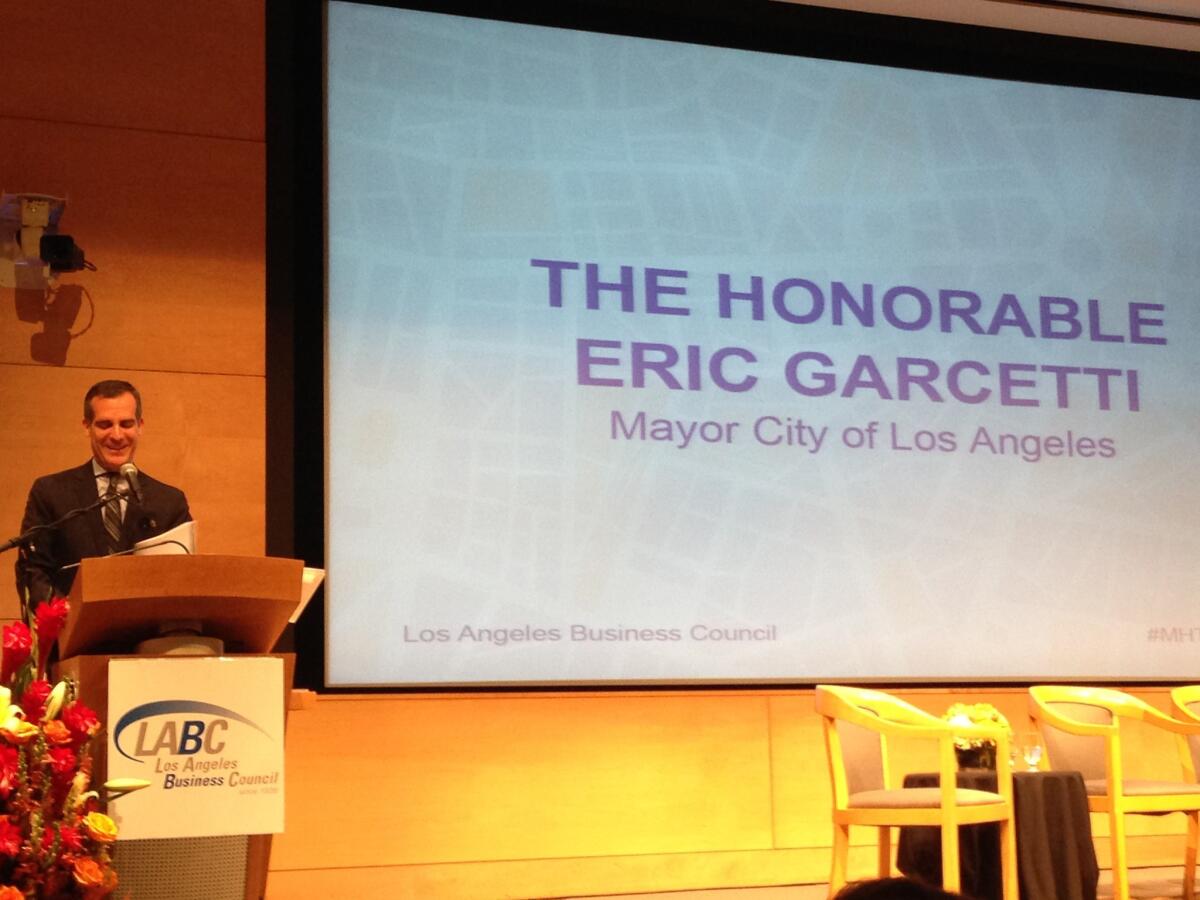Garcetti says housing shortage, minimum wage linked in Los Angeles

- Share via
The housing shortage in Los Angeles – possibly the most severe since the end of World War II – is linked to a low minimum wage and a host of other economic issues in the city, according to Mayor Eric Garcetti.
Garcetti, in a speech at the Mayoral Housing, Transportation & Jobs summit on Wednesday, unveiled plans to build 100,000 new housing units by 2021.
“But the fact remains that even with dramatic increases in market-rate and affordable housing, L.A. will continue to be an expensive city in which to live,” Garcetti said at the event, which was hosted by advocacy group Los Angeles Business Council at the UCLA Anderson School of Management.
Garcetti is proposing to raise the minimum wage in the city to $13.25 an hour by 2017 and then indexing future increases to inflation.
He noted that 567,000 Angelenos are considered minimum wage workers. Enough residents live under the federal poverty line to rival the population of one of the ten largest cities in the country, he said.
“We cannot afford the poverty rate we have in this town,” he said.
Garcetti, in a separate interview with The Times, said he has coordinated wage proposals with surrounding cities such as Beverly Hills, Santa Monica, West Hollywood, Long Beach and Pasadena.
But Los Angeles may be the first to succeed, Garcetti said.
“We can sustain it, just to be clear, even if no one else passes it,” he said. “Some people say you might create a wage island, but I think there’s a vice versa pressure not to become a poverty pocket.”
Garcetti said he’s “open” to a pitch from some council members to increase the wage floor to $15.25 by 2019, but cautioned that “you can go up too fast, too high, too soon.”
He also said he’s not opposed to other council members who want more economic analysis conducted on his proposal. But, he said, he’s loathe “to see studies become an excuse for breaks.”
“I would never claim that with [$13.25] there aren’t going to be any losers, but there are more net winners for sure,” he said.
Garcetti took the podium Wednesday after several hours of speakers – including congresswomen Janice Hahn and Maxine Waters. Several panels addressed topics such as the potential for a downtown innovation district akin to those in Seattle and St. Louis.
Airbnb’s regional head of public policy, David Owen, called Los Angeles “the creative capital of the world.” Wal-Mart’s senior director of public affairs and government relations, Joseph Quinn, said the mega-retailer is spending billions of dollars buying from suppliers in Los Angeles County.
Aja Brown, Compton’s youngest ever mayor at 32 years old, talked about revitalization efforts that have led to “tremendous growth” in retail and industrial development in her city.
“There’s huge opportunity in Compton,” she said. “There’s a lot of money in a small footprint.”
Marty Bailey, the chief manufacturing officer of American Apparel, said that maintaining and growing the sewing workforce at the company is one of its largest challenges.
Part of the problem is the stigma around apparel work, which most Americans associate with sweatshop conditions, he said. But being unable to hire undocumented candidates is also frustrating, he said.
“Imagine that all of a sudden, the Lakers had access to Lebron [James], to Carmelo [Anthony], to Anthony Davis, to some of the biggest talent in the NBA,” Bailey said. “That’s what immigration reform would be for American Apparel.”
Twitter: @tiffhsulatimes
More to Read
Sign up for Essential California
The most important California stories and recommendations in your inbox every morning.
You may occasionally receive promotional content from the Los Angeles Times.







